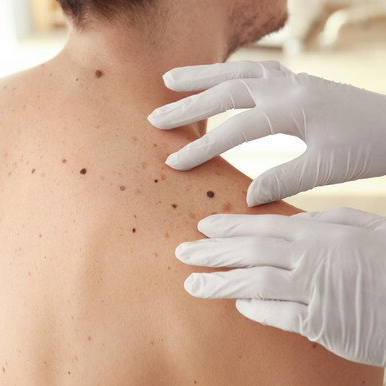Skin Cancer Facts
Australia has one of the highest rates of melanoma in the world, and melanoma is often referred to as 'Australia's national cancer'.
- Australia has the highest melanoma rates in the world. It is expected that 16,000 people will be diagnosed with melanoma this year. That means one person is told they have melanoma every 30 minutes.
- Melanoma is the most deadly form of skin cancer. It is estimated 1300 people will die from melanoma in Australia this year.
- Melanoma is the most common cancer affecting 15 to 39 year-old Australians.
- Melanoma is the third most common cancer in Australian men, after prostate and bowel cancer.
- Melanoma is the third most common cancer in Australian women, after breast and bowel cancer.
Annually, over 750,000 people are treated for non-melanoma skin cancers in Australia. These non-melanoma skin cancers are twice as common in men.
It is generally recommended that you have a skin cancer screening test once a year. This should be more regularly performed if you are at risk.
Source - Melanoma Institute Australia
Get Familiar With Your Skin & Body
We encourage patients to be familiar with their skin and to be aware of any changes that might suggest skin cancer.
Look for any changing spot on your skin. Look at any:
- Crusty sores
- Skin lesions that don't heal
- New spots
- Freckles or moles
- Skin areas or lesions that change in colour, shape or thickness
If you notice any of these changes, arrange an appointment with our doctors for a skin check as a matter of urgency.
Everyone Benefits From Regular Skin Checks
The good news is that skin cancer is one of the most preventable forms of cancer in Australia. Having regular skin checks will help you be aware of any skin changes.
This should include checking areas that are normally hidden from the sun because skin cancer can develop anywhere on the body.
Higher Risk Skin Cancer Patients
The following people should consult their doctor about more regular testing and skin checks:
Prior Diagnosis
People who have had skin cancer previously are at higher risk for developing other skin cancers over the years, either in the same area or elsewhere on the body.
For these patients, regular screening and full body mapping should be routine so that not only the site(s) previously treated are monitored, but the entire skin surface can be examined and compared for changes.
Skin cancers on the scalp and nose are especially troublesome, with recurrences typically taking place within the first two years following surgery.
Exposure to Sunshine
Both long-term sun exposure over your lifetime and occasional extended, intense exposure (typically leading to sunburn) combine to cause damage that can lead to skin cancer.
Almost all skin cancers occur on parts of the body excessively exposed to the sun — especially the face, ears, neck, scalp, shoulders, and back.
Age
The risk of skin cancer increases with age both as a result of cumulative sun exposure and the degenerative nature of ageing.
The likelihood increases for both males and females over 50 years old, but as the number of new cases has increased sharply each year in the last few decades, the average age of onset in patients has steadily decreased.
Genetic Factors
The tendency to develop skin cancers can also be inherited. People who are at the highest risk have the following genetic features:
- fair skin
- blonde or red hair
- blue, green, or grey eyes
- family history of skin cancer
Suspicious Moles Diagnosed
Accuracy is important when dealing with melanoma, as you don’t get a second chance. Our doctors are experienced at skin cancer diagnosis and treatment, including the following forms:
- Actinic Keratosis
- Atypical Moles
- Basal Cell Carcinoma
- Squamous Cell Carcinoma
- Melanoma
Skin Cancer Education
Knowledge is power, which is why we want you to know what lesions to look out for and how to protect yourself and your family. Many patients have identified skin cancer on their friends and family members after their skin check appointment with us.
Head to Toe Skin Check
Our staff, advanced technology and experienced doctors will conduct a thorough examination of your skin, assessing moles using a dermatoscope – a device used to view the intricate structure of a mole.
Moles which are suspicious will be imaged using a specialised digital dermoscopic camera to create a view of the internal structure (dermoscopic image) and the external structure (clinical image) for subsequent medical diagnosis and comparison. This assists in monitoring the skin spot or lesion to assist with early detection and treatment.
Skin Cancer Prevention
Protect Your Skin
For best protection, we recommend a combination of sun protection measures:
- Slip on some sun-protective clothing – that covers as much skin as possible
- Slop on broad spectrum, water resistant SPF30+ sunscreen. Put it on 20 minutes before you go outdoors and every two hours afterwards. Sunscreen should never be used to extend the time you spend in the sun.
- Slap on a hat – that protects your face, head, neck and ears
- Seek shade
- Slide on some sunglasses – make sure they meet Australian standards.
Be extra cautious in the middle of the day when UV levels are most intense.
Beach Road
Surgery & Skin Clinic
Address:
116 Beach Road,
Batemans Bay, NSW 2536
Phone:
Opening Hours:
Monday - Friday: 9:00am - 4:30pm











